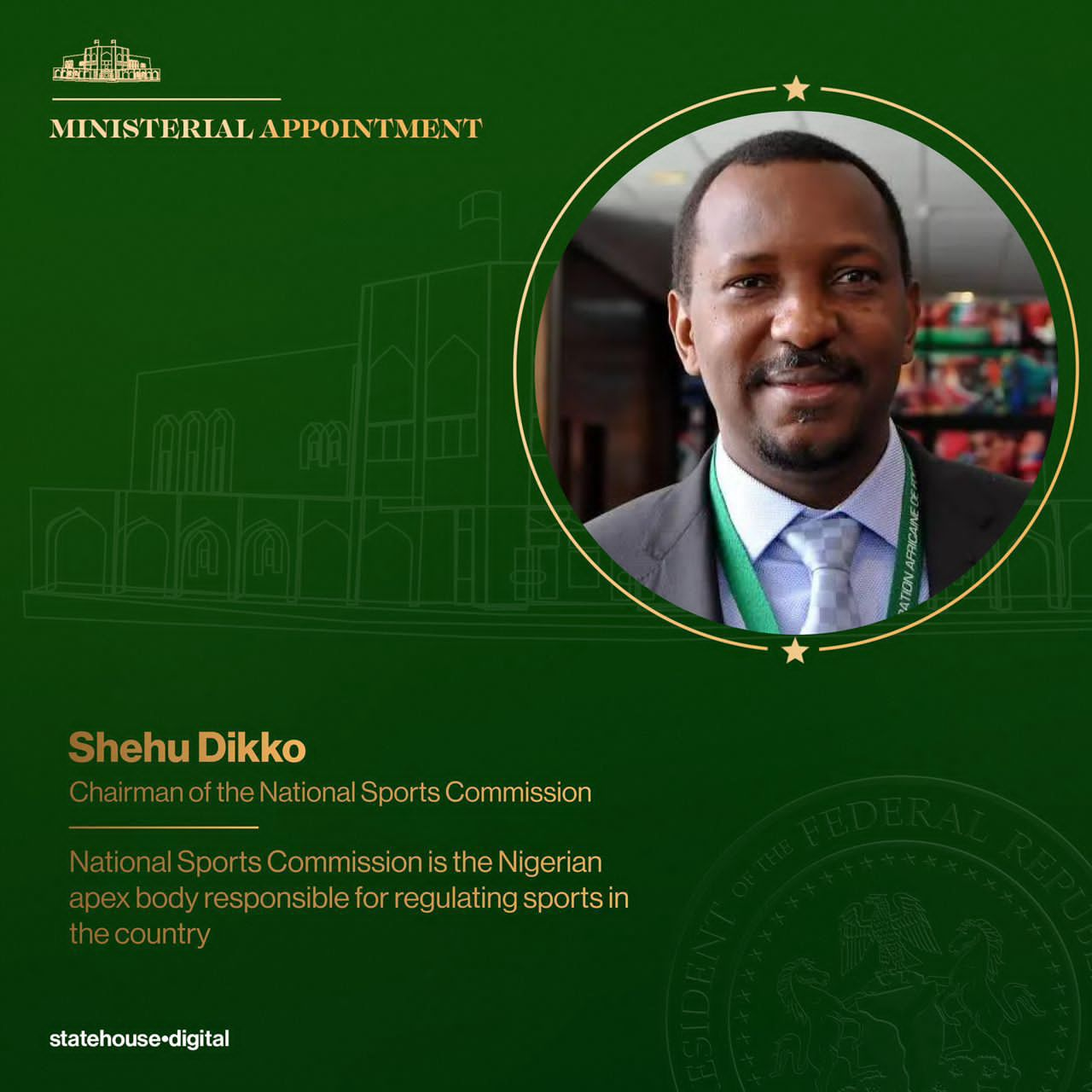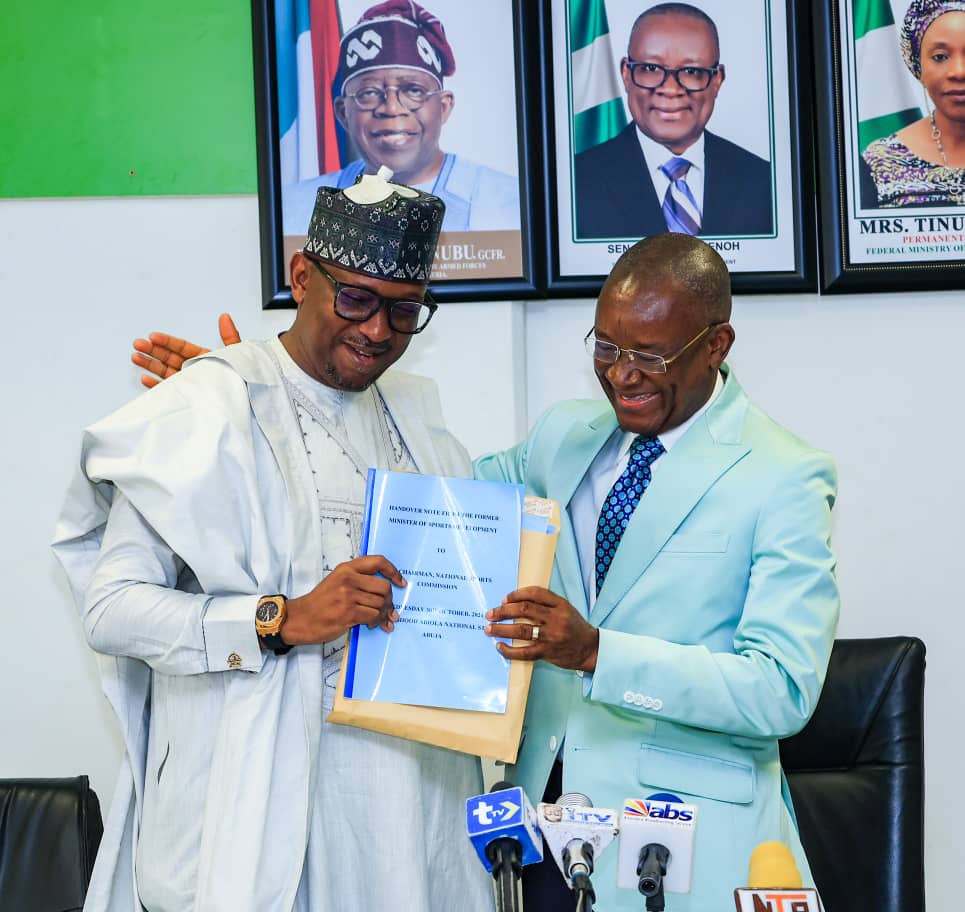Sports
Shehu Dikko: The Rejected Stone that Became a Cornerstone

By Joel Ajayi
The remarkable turnaround for Mallam Shehu Dikko serves as a powerful reminder that “one with God is more than the majority.”
The turbulent waters of sports politics almost swept him away. Bruised and battered by the machinations of his rivals, Dikko’s good name faced intense scrutiny. In 2016, on his way to Warri, Delta State, to contest for the position of President of the Nigeria Football Federation (NFF), he was reportedly detained in Lokoja over an issue unrelated to sports. This attempt to block his ambitions was a testament to the lengths some would go to halt the Kaduna-born administrator.
In 2019, the Independent Corrupt Practices and Other Related Offences Commission (ICPC) implicated Dikko in allegations of mismanaging $2.7 million from FIFA’s Financial Assistance Programme during his tenure at the NFF. The ICPC subsequently seized several of his properties. However, the Federal High Court dismissed the case after an order from the then Attorney General of the Federation, Abubakar Malami, instructed a withdrawal of the charges. Through it all, Dikko remained focused on his mission to develop Nigerian football, contributing significantly to the league’s growth.
Though he contested the NFF presidency again in the 2023 Edo election, he lost due to unexpected opposition. Many assumed this would mark the end of Dikko’s influence in Nigerian sports. However, fate had different plans. Like Mordecai in the Bible, Dikko’s dedication and contributions were finally acknowledged, and he was appointed Director General of the National Sports Commission (NSC) by President Bola Tinubu. His new role marks a pivotal restructuring within Nigeria’s sports sector.
Dikko’s appointment signifies not only a redemption but a multiplication of honor. Initially aspiring to lead a single sports federation, he now oversees over 40 as head of the NSC. This unprecedented responsibility demonstrates the level of trust vested in him. Previously serving as Vice President of the NFF and Chairman of the League Management Company (LMC), Dikko brought strategic insight and growth to Nigerian football.
His track record as CEO of the LMC, where he notably enhanced the financial value of Nigeria’s football league, attests to his vision and commitment to both performance and commercial success. As a top sports administrator, Dikko’s expertise is expected to bring impactful changes to Nigeria’s sports landscape. However, the task ahead remains daunting. Revitalizing the nation’s sports sector will require collaboration across a broad spectrum of stakeholders, including sports federations, athletes, corporate bodies, and government agencies.
Dikko has set out ambitious goals, emphasizing that his role extends beyond sports competitions. He envisions the NSC as an institution that shapes lives, fosters economic growth, and builds community. “My aim is to see sports as an integral part of Nigeria’s development agenda, not as an afterthought,” he said recently.
Though challenges persist—such as funding constraints, inadequate facilities, and limited athlete support—many believe that Dikko’s leadership could usher in a transformation. His ambitious plans for the NSC have sparked cautious optimism that Nigeria’s sports sector can become a model for development across Africa.
As Dikko embarks on this new journey, Nigerians remain hopeful that under his leadership, sports can become a unifying force, a robust economic driver, and a source of national pride.
Joel Ajayi is a sports writer and analyst based in Abuja.
Sports
Fresh Air, As Dikko Resumes As NSC Chairman, Unveils 3-Pillar For Sports Growth

Joel Ajayi
The newly appointed Chairman of National Sports Commision Malam Shehu Dikko on Wednesday officially assumed office unveiled 3 Pillars to growth sport sector.
Just last week President Bola Ahmed Tinubu appointed Shehu Dikko as Chairman of the National Sports Commission.
Speaking shortly in Abuja after outgoing Minister of Sports Senator John Enoh officially handed over the affairs of the Country’s Sports to him in a brief ceremony in Abuja.
He expressed that the Country’s journey towards a sustainable Sports Economy has begun.
According to him, history has a way of coming full circle because in 2008 I was a consultant to the House of Representatives and was responsible for the drafting of the National Sports Commission Bill and about 16 years down the line i have here with the assignment to implement the work I assisted to put together”.
“The objective of Mr President is to harness the full potentials of the Sports Economy in Nigeria”.
“And we have to first change our mindset from the fixation of just competitions and winning medals and come back and fix our Domestic Sports Development”.
“When we set the foundation right the results and the winning of medals will naturally come in a sustainable manner and that should be the new mindset”.
“We cannot continue to run in cycles so we need to have a different approach from day one because in my view and indeed the view of President Bola Ahmed Tinubu, competitions is what we call “Consumption” because we just take scarce resources and burn out abroad without any impact on the domestic sports development and the Nigerian Economy.
“But we have to go back to “Production” which is deliberate Sports Development, where we set the structure right, set the framework and put together good parameters to have a sustainable Sports Development which will naturally give us a solid Sports Economy and indeed guaranteed competitive participation at all competitions and medals.
“This is the reason why our administration will be focus on three Pillars including running Sports as a National Asset, that is entitled to special privileges, regulations and concessions to drive growth and development to open its potentials to be a key driver of the economy across all sectors, a vehicle for achieving national cohesion and projection of the positive and unique attributes of our culture and national identity “.
” We have to also work on Legislations and Regulations so as to set the framework to enable the Industry to grow effectively like what happened in the communications industry some years back”.
” The other Pillar is investing in purposeful world class infrastructures that will provide an enabling environment for Growth. These infrastructures must be deliberate with maintenance culture and span from world class infrastructure for professional sports to community infrastructure to drive grassroots sports and mass participation across the country.
” The thinking of Mr President is that , after having some of all these in place we should be able to measure the Country’s Sports by its contribution to the nation’s GDP by at least three percent and the number of jobs sports and its value chain are providing in country in the next four to five years and indeed our competitiveness across all competitions and tournaments.
Thus it’s a fantastic decision for Mr. President to approve the return of the National Sports Comission to drive the process and objectives in line to the best international practices and standards devoid of any beureucratic bottlenecks but absolute professionalism.”
In his remark, the outgoing Sportst Minister Senator John Enoh expressed: “For me it’s farewell, it’s bye bye and for mallam shehu Dikko it’s welcome that is what life is all about, there is time for everything.
He however thumbed president Tinubu for scrapping Sports Ministry and bring back the NSC to enable sports to grow in the country, saying that the decision remain a great positive that will grow Sports.
On his remark, the most senior staff of the ministry, Director of Medicine Paul Onyedo pledged staff support to work with incoming Chairman to the best of their ability. “We are ready to give our best.”
-

 Featured5 years ago
Featured5 years agoLampard Names New Chelsea Manager
-

 Featured5 years ago
Featured5 years agoFG To Extends Lockdown In FCT, Lagos Ogun states For 7days
-

 Featured5 years ago
Featured5 years agoNYSC Dismisses Report Of DG’s Plan To Islamize Benue Orientation Camp
-

 Featured5 years ago
Featured5 years agoChildren Custody: Court Adjourns Mike Ezuruonye, Wife’s Case To April 7
-

 Featured3 years ago
Featured3 years agoTransfer Saga: How Mikel Obi Refused to compensate me After I Linked Him Worth $4m Deal In Kuwait SC – Okafor
-
Sports2 years ago
TINUBU LAMBAST DELE MOMODU
-
Featured5 years ago
Board urges FG to establish one-stop rehabilitation centres in 6 geopolitical zones
-

 News1 year ago
News1 year agoJubilation In Kaduna As Tribunal Upholds Ekene Adam Winner Of Reps Election
